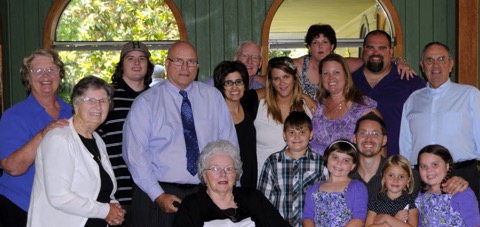Jul 2011
Adopted

It was a quick two-day trip that almost didn’t happen. The occasion was a graveside service for Joan’s Uncle Al last Friday in Nevada City (between Sacramento and Reno). After recovering from the shock of no-advance-purchase air fares, I found an affordable air-plus-hotel package into Reno (half the price of the air fare alone, apparently sold with the vain hope that I would gamble in the hotel’s casino) and went down for the service. I’m glad it did.
We gathered for lunch after the service and shared stories about this kind and gentle man whose characteristics make me glad I married into the Gustafson family. It was as we were leaving that someone observed how blessed we were to have been accepted and grafted in to this family. We were related not by blood but by choice.
When we were kids, my brothers and I occasionally teased each other by claiming that one of us (whoever was the target on that particular day) was adopted. Our teasing, of course, missed the point. Adopted - chosen - is good! I’m thankful and proud that this family, part of which gathered last Friday, includes me.
Comments
The Invisible Woman
Tue 12 Jul 2011 Filed in: Hmmm...

How could such a thing be? Her home was not in the outback, far removed from civilization; it was in Sydney. It boggles my mind that anyone could be so invisible that for eight years no relative, neighbor, or pension-paying government could notice that she was dead. I could take comfort that it happened on the other side of the world were it not for my suspicion that it could happen here, too.
One of the tragic results of the kind of me-ism that is epidemic in our culture is that everyone else becomes unimportant because I am too busy with me. I think it flies in the face of God’s intent; it seems to me that we have been created and called to community, like it or not. In the independent Northwest (and I suppose in independent Australia) some people don’t like it. And if I’m honest, I have to admit that sometimes I am one of them. Which leaves me wondering if there is anyone in my world who is so invisible that I would not notice his death. The thought gives fresh perspective to the psalmist’s observation that to God, the death of his loved ones is precious.
A Great Relief?
Mon 11 Jul 2011 Filed in: Reflections | Grief Notes
It was watching the news that reminded me of a great Katharine Hepburn quote: Death, she said, will be a great relief. No more interviews. Of course, unlike many of today’s talking heads, Hepburn, who died eight years ago, was at least interesting to hear.
Death is an easy joke until it hits close to home as it did again this morning when I got word of the death of Joan’s Uncle Al. Death, particularly the death of someone loved and valued, scratches at the scars of previous losses and stirs afresh the strangely familiar strains of grief mingled with joyful memories.
It’s easy to respond to the idea of death being a great relief because we are used to thinking of death in terms of what it is not. For Hepburn, no more interviews. For others, perhaps no more pain. No more disease. No more-- (fill in the blank with your favorite human frustration). But I think that we often look at death backwards.
To be absent from the body (the no more view) is, Paul said, to be present with the Lord. I suppose it is harder, but more helpful, to think of death in positive terms as a great beginning rather than as a great relief. Doing so does not lessen the loss or end the grief, but it helps me understand a little more clearly what Paul’s words mean about the loved ones I have lost. Al’s experience (and Matt’s, Joan’s, and every other believer who has died) is best described not in terms of absence, but of presence. Great relief does not do justice to finding oneself in the presence of the infinitely holy and unconditionally loving Savior.
Death, Katharine, is far more than a great relief!

Death is an easy joke until it hits close to home as it did again this morning when I got word of the death of Joan’s Uncle Al. Death, particularly the death of someone loved and valued, scratches at the scars of previous losses and stirs afresh the strangely familiar strains of grief mingled with joyful memories.
It’s easy to respond to the idea of death being a great relief because we are used to thinking of death in terms of what it is not. For Hepburn, no more interviews. For others, perhaps no more pain. No more disease. No more-- (fill in the blank with your favorite human frustration). But I think that we often look at death backwards.
To be absent from the body (the no more view) is, Paul said, to be present with the Lord. I suppose it is harder, but more helpful, to think of death in positive terms as a great beginning rather than as a great relief. Doing so does not lessen the loss or end the grief, but it helps me understand a little more clearly what Paul’s words mean about the loved ones I have lost. Al’s experience (and Matt’s, Joan’s, and every other believer who has died) is best described not in terms of absence, but of presence. Great relief does not do justice to finding oneself in the presence of the infinitely holy and unconditionally loving Savior.
Death, Katharine, is far more than a great relief!
Your Church is Too...
Mon 04 Jul 2011 Filed in: Reflections
Your church is too... Fill in the blank; big, small, formal, loud, restrictive, old, ingrown.... The list goes on. If your church is Garden Grove’s Crystal Cathedral, the answer apparently is bankrupt. I’ve never been quite comfortable with crystal cathedrals, so when I read that Robert Schuller had been ousted from the board of the Southern California landmark church he founded decades ago, I was neither terribly surprised nor terribly upset. Saddened, yes, but not surprised. It began as a drive-in church, became a widely recognized institution, and now is bankrupt, perhaps a victim of its own perceived success.
Several days ago I was enjoying a conversation with a number of other pastors where the question was posed, what IS a healthy church? While the question stimulated some discussion, I don’t recall that it was ever actually answered. My denomination has attempted an answer with a list of ten “leading indicators” of church health, but the list doesn’t quite do it for me, perhaps a reflection of the fact that I am not and have never aspired to be a denominational executive.
The trouble with church health discussions is that they inevitably seem to lead to the feeling that my church is too (fill in the blank). And most of the time there is a great gulf between the feeling and fact. I am convinced that many churches suffer unnecessarily from an ecclesiological inferiority complex, the result of hearing what is too often a great lie that they are too something or not enough something else. The problem arises for a couple of reasons. First, people have confused the church (the body of Christ that includes all believers) with a particular local congregation and wrongly assumed that the local congregation should be everything that the church universal is called to be and do. When Jesus said “I will build my church,” he wasn’t talking about merely your congregation. Second (and more critically), people have focused more on the local expression of the church than they have on the Lord of the church. If you believe your church is too something, could it be because you have become distanced from its Head?
A staggering number of American pastors believe that their congregation is too small. What is more often true is that their view of the church is too small. Wherever God’s people gather, there is his church, and whether it be two or two thousand and whatever the form may be, if the Lord is worshipped, he is pleased.

Several days ago I was enjoying a conversation with a number of other pastors where the question was posed, what IS a healthy church? While the question stimulated some discussion, I don’t recall that it was ever actually answered. My denomination has attempted an answer with a list of ten “leading indicators” of church health, but the list doesn’t quite do it for me, perhaps a reflection of the fact that I am not and have never aspired to be a denominational executive.
The trouble with church health discussions is that they inevitably seem to lead to the feeling that my church is too (fill in the blank). And most of the time there is a great gulf between the feeling and fact. I am convinced that many churches suffer unnecessarily from an ecclesiological inferiority complex, the result of hearing what is too often a great lie that they are too something or not enough something else. The problem arises for a couple of reasons. First, people have confused the church (the body of Christ that includes all believers) with a particular local congregation and wrongly assumed that the local congregation should be everything that the church universal is called to be and do. When Jesus said “I will build my church,” he wasn’t talking about merely your congregation. Second (and more critically), people have focused more on the local expression of the church than they have on the Lord of the church. If you believe your church is too something, could it be because you have become distanced from its Head?
A staggering number of American pastors believe that their congregation is too small. What is more often true is that their view of the church is too small. Wherever God’s people gather, there is his church, and whether it be two or two thousand and whatever the form may be, if the Lord is worshipped, he is pleased.